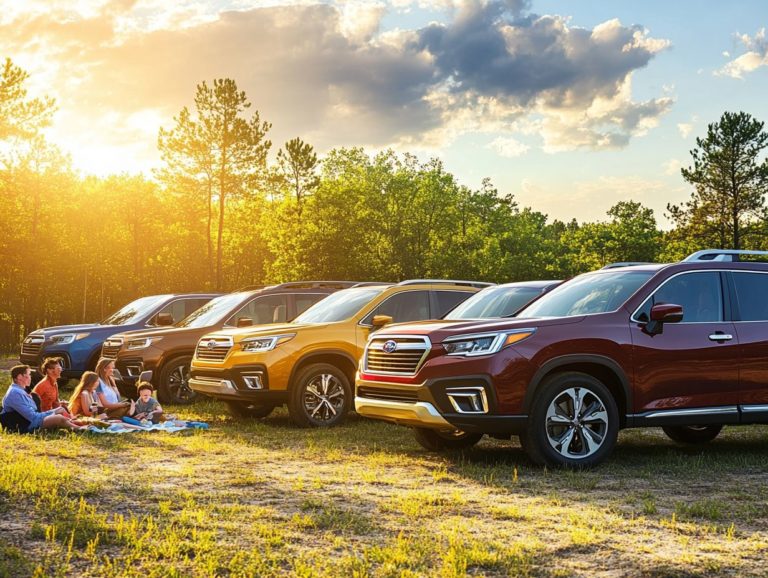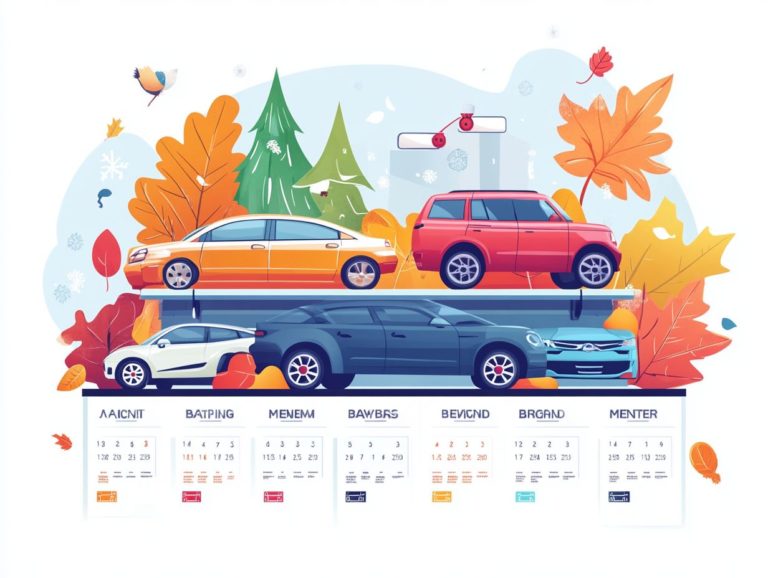Tips for First-Time New Car Buyers
Buying your first new car is both an exhilarating and somewhat overwhelming journey. With a myriad of options, budgets, and features to contemplate, it’s crucial to approach this process with a clear mind.
This guide is designed to help you navigate through each step, from determining your budget and prioritizing your needs to exploring the various financing options available. You ll discover valuable tips for negotiating deals that can save you big bucks!
Contents
- Key Takeaways:
- Understanding Your Needs
- Financing Options for New Cars
- Negotiating the Best Deal
- Important Features to Consider
- Maintenance and Insurance Costs
- Finalizing Your Purchase
- Frequently Asked Questions
- What are some tips for first-time new car buyers?
- What are some common mistakes first-time new car buyers should avoid?
- Should I buy a new or used car as a first-time buyer?
- What steps should I take to prepare for buying my first car?
- What are some costs to consider when buying a new car for the first time?
- Can I negotiate the price of a new car as a first-time buyer?
Key Takeaways:

- Determine your budget and priorities before researching car models to make a smart buying decision.
- Consider the pros and cons of leasing vs. buying and understand interest rates and loan terms to make an informed financing choice.
- Negotiate with dealerships by doing thorough research and utilizing negotiation tips to get the best deal possible.
Understanding Your Needs
As you embark on the exciting journey of buying a car, grasping your unique needs and preferences is paramount for making an informed decision. Whether you’re on the hunt for a brand-new vehicle, a trustworthy used car, or an eco-friendly electric option, the process starts with a careful evaluation of your driving requirements and lifestyle. Additionally, your guide to car financing for first-time buyers can provide valuable insights to help you navigate your options.
Reflect on factors like family size, daily commute, and the features you desire to pinpoint the perfect match for you. Knowing your budget helps make car ownership easier, including possible car loans and insurance costs. For a more seamless process, consider these 5 tips for a smooth new car purchase experience. This understanding will pave the way for a smoother transition into car ownership.
Identifying Your Budget and Priorities
Identifying your budget and priorities is absolutely essential in the car buying process, laying the groundwork for knowledge-based decision making. To ensure you’re well-prepared, consider how to prepare for a new car purchase by evaluating your financial situation to determine a realistic down payment and the monthly payments you can comfortably manage.
Understanding your credit score is equally important, as it significantly impacts the financing options available to you, influencing the interest rates and terms of your auto loan or dealership financing. To truly grasp the full scope of these factors, consider crafting a detailed budget that encompasses not just the car payments but also additional expenses like insurance, maintenance, and fuel.
Utilizing tools such as spreadsheets or budgeting apps can streamline the tracking of your expenses and reveal areas for potential adjustments. For example, if you have a penchant for saving for vacations, opting for a more economical vehicle might be a wise choice to keep your monthly expenditures in check.
By consistently reviewing and improving your credit score through responsible financial habits, you can secure better loan conditions, making car ownership more manageable and aligned with your personal priorities.
Researching Different Car Models
Researching different car models is an exhilarating yet crucial step in your car-buying journey, enabling you to discover a vehicle that perfectly aligns with your driving needs and budget. Begin by identifying popular models like the Honda Civic and Toyota Camry, both celebrated for their reliability and strong resale value. Don’t overlook the burgeoning market for electric and hybrid vehicles, which can offer long-term savings through reduced maintenance costs and impressive fuel efficiency.
To make a truly informed decision, evaluating safety ratings from reputable sources such as the National Highway Traffic Safety Administration (NHTSA) and the Insurance Institute for Highway Safety (IIHS) is essential. Reliability is equally important; diving into consumer reports and expert reviews will provide valuable insights into a car’s long-term performance.
When considering used options, make sure to leverage vehicle history resources like Carfax or AutoCheck to ensure you re making a sound investment.
As you compare the merits of electric, hybrid, and traditional vehicles, take a closer look at their:
- Environmental impact
- Cost of ownership
- Available incentives
These factors will serve as a guiding compass in your decision-making process, leading you to the perfect vehicle for your lifestyle.
Now, you re ready to start your car-buying journey with confidence!
Financing Options for New Cars
Understanding the many financing options available for new cars is essential for making an informed purchase decision, especially for those seeking essential tips for first-time car leasees, given the various choices tailored to diverse financial circumstances.
From traditional auto loans offered by banks such as PNC Bank to dealership financing, each avenue presents its own set of advantages and disadvantages. Furthermore, navigating the preapproval process can provide you with clearer insight into your budget, ultimately enhancing your negotiating power as you finalize your financing terms.
Leasing vs. Buying

When weighing your options for financing a new vehicle, one of the most significant decisions you’ll face is whether to lease or buy. Each path has unique advantages and implications for car ownership.
Leasing usually means lower monthly payments, plus you can drive a new car every few years. In contrast, buying grants you full ownership, allowing you the freedom to modify or sell your vehicle whenever you wish.
If you enjoy driving the latest models without a long-term commitment, leasing might be your best friend. With its lower upfront costs and the peace of mind that comes from warranty coverage throughout the lease term, it s an appealing option. However, keep in mind that leasing often comes with mileage restrictions something that could be challenging for frequent travelers or heavy commuters, potentially leading to additional fees.
On the flip side, purchasing a vehicle may require a heftier financial commitment upfront, but it can pay off in the long run as you build equity an asset that can be leveraged down the road. Therefore, understanding your individual driving habits and financial circumstances is crucial in making the right decision for you.
Understanding Interest Rates and Loan Terms
Grasping interest rates and loan terms is vital as you navigate the financial landscape of purchasing a car. These factors significantly influence your monthly payments and overall expenses.
A higher credit score often leads to lower interest rates, saving you hundreds or even thousands over the life of your auto loan. That’s why being well-informed about how these elements affect your financing options is crucial.
For example, if you have a credit score of 720, you’re likely to secure a better rate than someone with a score of 640. This difference can result in lower monthly payments and reduced overall loan costs. To enhance your credit score before diving into the car-buying process, focus on paying down existing debts and ensuring your bills are paid on time; these actions can significantly boost your creditworthiness.
Compare loan offers from various lenders to spot differences in interest rates and terms. Even a seemingly minor percentage difference can lead to significant savings. For instance, choosing a 4% interest rate over a 6% rate could save you nearly $2,000 over a five-year term on a $20,000 loan.
Negotiating the Best Deal
Negotiating the best deal when purchasing a car can dramatically influence your overall expenses, making it crucial to approach the process armed with essential tips for new car buyers and strategies.
By understanding the dealership’s financing options and being transparent about your budget for the down payment and acceptable monthly payments, you position yourself to navigate negotiations confidently, ultimately securing the most advantageous terms.
Don t miss out on checking all available financing options and make the best choice today!
Tips for Negotiating with Dealerships
Negotiating with dealerships can seem intimidating, but with the right tips, you can secure the best possible deal. Start by conducting thorough research on vehicle pricing and understanding the trade-in value of your current car. Familiarize yourself with the dealership’s financing offers. Being well-prepared gives you a significant advantage during discussions.
Approach the negotiations with a calm demeanor; this can help diffuse tension and promote constructive dialogue. Before closing any deal, inspect the vehicle thoroughly to uncover potential issues that could affect pricing.
When you receive an initial offer, consider countering with a well-researched figure. This showcases your confidence and strengthens your position, making it harder for sales staff to dismiss your request.
Aim for a win-win deal where you both walk away happy!
Important Features to Consider
When you select a car, make sure to think about key features like safety and technology. Additionally, consider tips for budgeting to ensure that your vehicle aligns perfectly with your needs.
Seek robust safety features, including advanced driver-assistance systems like automatic emergency braking, which helps prevent crashes. Don’t overlook cutting-edge technology that enhances both convenience and the joy of driving.
Don t forget to consider the potential maintenance costs; they play a significant role in your overall ownership experience.
Safety Features

When choosing a car, safety features are essential for protecting you and your passengers. Prioritize advanced driver-assistance systems that elevate vehicle safety, such as automatic emergency braking, lane-keeping assist, and adaptive cruise control. These innovations significantly reduce the risk of accidents.
These features work together for a safer driving experience. For instance, automatic emergency braking can detect collisions and automatically apply the brakes if you don’t react in time, potentially reducing front-end crashes by up to 50%. Lane-keeping assist uses cameras to monitor lane markings and nudges the steering wheel to help keep you centered, decreasing the chance of lane departure.
Adaptive cruise control adjusts your speed according to surrounding traffic, alleviating stress during long drives. Statistics show these vehicles have a much lower accident rate, making them a smart investment for anyone prioritizing safety.
Technology and Convenience Features
Technology and convenience features significantly enhance your driving experience, making them vital during your car shopping journey. Modern vehicles often come equipped with advanced infotainment systems integrating smartphone connectivity, navigation, and voice commands.
Take, for example, the Tesla Model 3 and the Audi A6, which boast intuitive touchscreens. These screens control audio, climate, real-time traffic updates, and a variety of entertainment options, keeping you engaged while focused on the road.
Connectivity options like Bluetooth and Wi-Fi hotspots further elevate your experience, allowing you to stream music and access navigation directly from your devices. Improvements in driver comfort like ergonomic seating and customizable ambient lighting make long drives enjoyable. This underscores the necessity of considering these modern features when selecting your next vehicle.
Maintenance and Insurance Costs
Understanding the nuances of maintenance and insurance costs is crucial for managing your overall budget for car ownership. These expenses can vary considerably based on the vehicle model you choose.
Regular maintenance is vital for your car’s longevity. Examining the vehicle’s history can provide valuable insights into anticipated maintenance costs, helping you make informed decisions aligned with your financial plans.
Factors that Affect Maintenance and Insurance Costs
Several factors influence the maintenance and insurance costs associated with car ownership, shaping your overall budget. The type of vehicle you select is an important factor; luxury or high-performance models often come with steeper insurance premiums and maintenance expenses compared to their more common counterparts.
The age and mileage of the vehicle are also critical elements to weigh. Older cars typically require more frequent repairs and may not qualify for the most economical and safest insurance options. Assess the safety ratings of your potential vehicle; higher ratings often lead to lower insurance rates due to their reduced risk profile.
When you compare insurance quotes, gather comprehensive information about coverage options, deductibles, and local rates. For maintenance expenses, take the time to review service history and consult online resources. By understanding these factors, you empower yourself to make informed decisions regarding the costs of car ownership.
Finalizing Your Purchase
Finalizing your purchase is the exciting climax of your car-buying journey! Achieving a seamless experience demands meticulous attention to detail. From completing the necessary paperwork and securing financing to conducting a comprehensive vehicle inspection, each step is crucial for ensuring you extract the utmost value from your investment.
Tips for a Smooth Buying Process

Ensuring a smooth buying process demands meticulous planning and an eye for detail, particularly when navigating paperwork and vehicle inspections. Being well-prepared can truly transform your experience! Familiarize yourself with the necessary documents and know what to expect when buying a new car to anticipate what lies ahead in the transaction.
- Compile essential documents like your driver s license, proof of insurance, and financing pre-approval to streamline the entire process.
- Adopt a systematic approach for vehicle inspections: check the exterior for any signs of damage, inspect the tires for wear, and ensure the interior is in top-notch condition.
Understanding dealership financing offers is vital. Seek out competitive interest rates and delve deeply into the terms and conditions. Additionally, when considering the financial aspects, it’s beneficial to know how to prepare for new car ownership. Don’t hesitate to ask about any potential hidden fees that could impact your overall budget, enabling you to make informed decisions throughout the buying journey!
Frequently Asked Questions
What are some tips for first-time new car buyers?
- Do your research. Make sure to explore different car models, prices, and dealerships to find the best fit for your budget and needs.
- Consider both new and used cars. While a new car may seem tempting, a used car can often provide better value for your money.
- Get pre-approved for a loan. This gives you a better idea of how much you can afford and helps you negotiate a better price.
- Take a test drive. It’s important to physically test out a car before making a purchase to ensure it meets your expectations.
- Don’t forget about additional costs. Remember to budget for insurance, maintenance, and other fees when calculating the overall cost of owning a new car.
- Negotiate for the best deal. Don’t be afraid to negotiate with the dealership to get the best price for your new car!
What are some common mistakes first-time new car buyers should avoid?
- Not knowing your budget. It’s crucial to have a clear idea of how much you can afford before starting your car search.
- Skipping the test drive. A car may look great on paper, but it’s important to actually drive it to ensure it meets your expectations.
- Not considering long-term costs. Don’t just focus on the initial price of the car; also consider the cost of ownership over time.
- Falling for sales tactics. Don’t let pushy salespeople pressure you into buying a car that doesn’t fit your needs or budget.
- Not getting a vehicle history report. It’s essential to know the history of a used car before purchasing to avoid potential issues.
- Not getting multiple quotes. Don’t settle for the first offer you receive; shop around and compare prices from different dealerships.
Should I buy a new or used car as a first-time buyer?
There is no right answer; it depends on your preference and finances.
New cars often come with warranties and lower maintenance costs, while used cars tend to be more affordable but may require more inspection.
What steps should I take to prepare for buying my first car?
1. Set your budget and get pre-approved for a loan.
2. Research car models and dealerships.
3. Take a test drive and inspect the vehicle carefully.
4. Consider long-term ownership costs.
5. Negotiate to get the best deal.
6. Obtain a vehicle history report for a used car.
What are some costs to consider when buying a new car for the first time?
1. Insurance: Rates vary based on the model and your driving history.
2. Maintenance: Regular services like oil changes can add up.
3. Taxes and fees: These depend on your state and dealership.
4. Extended warranties: They can offer peace of mind.
5. Gasoline: Think about fuel efficiency and how often you ll refuel.
Can I negotiate the price of a new car as a first-time buyer?
Yes! You should always try to negotiate for a better price when buying a car.
Do your research and be ready to walk away if the dealership won t meet your budget.
Don t hesitate to ask for extras, like free maintenance or add-ons.






